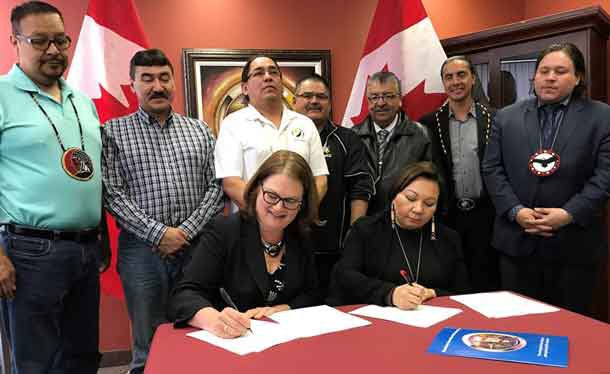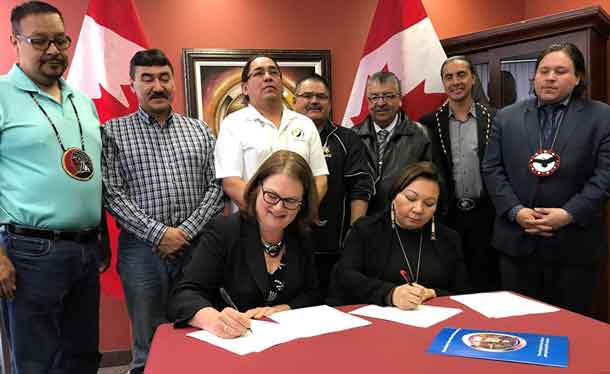
Treaty One Territory – On March 28th, the Manitoba Keewatinowi Okimakanak (MKO) and Indigenous Services Canada Minister Jane Philpott signed a memorandum of understanding that would see the parties work together in a First Nation led transformation of health care in the Keewatinowi territory. The agreement comes after more than 30 years of resolutions by the Chiefs-in-Assembly directing the MKO to advocate for local solutions to health care issues and to work with the federal government to improve health care in northern Manitoba.
“At MKO, we have always had the goal of locally driven and defined health care. We see this MOU as an agreement to talk and bring the concerns of MKO communities to the table, any consultation or following legislation must engage the grassroots people and service providers in the Keewatinowi territory. It is good to see that Canada is now willing to open such dialogues, and we thank Minister Philpott for her role in moving the First Nation and Canadian relationship closer to reconciliation,” Grand Chief North said. “It is obvious that some regions in Canada will need greater financial and capacity enhancing input than others. Manitoba and Canada have an amazing opportunity to solve the health-care crisis in the north and increase the number of jobs in remote communities by working with local First Nations to create a health-care system that addresses the concerns and needs of all northern communities,” said Sheila North, Grand Chief, Manitoba Keewatinowi Okimakanak.
The memorandum of understanding (MOU) formalizes principles that will guide future work between MKO First Nations and Canada. It is a commitment to work towards the improvement of the health and well-being of First Nation peoples and eliminate the disparity in health status between northern Manitoba First Nations and other Manitoba residents;
As the MKO is an advocacy organization, and it is not a party to the Numbered Treaties or considered to be a First Nation government, the MOU does not infringe on any treaty or Aboriginal right held by First Nations in Manitoba. It reflects a recent move to First Nation-led healthcare systems with successful models in northern Ontario and British Columbia.
The agreement is also meant to ensure:
- The adaptation and better integration of health and wellness programs within all jurisdictions by eliminating duplication, closing gaps and improving the coordination and efficacy of the healthcare systems;
- The parties work together to improve the recruitment, retention, and participation of professionals in the northern health system, with physicians and allied professionals as a priority;
- And they establish and define a collaborative and coordinated, bi-lateral partnership for a jointly articulated vision for a renewed relationship between the parties as it relates to health-improving both access to care and the health of First Nations people and their communities in northern Manitoba.
This would include a 10-year regional health plan with specific, targeted outcomes to be achieved within specified timeframes. After signing the Agreement, the parties will forward members for a Steering Committee to provide leadership and to oversee the implementation of the MOU and its commitments. Due to the remoteness of some MKO First Nations, and the years of limited access, it will take significant partnership work to create a local health care system in the Keewatinowi territory that has the same level of infrastructure and provides the same level of care as other regions in Manitoba. The Keewatinowi region has some of the worst health care outcomes in Canada, local areas with over 10,000 people that have no road network connecting them to the south, and some of the worst shortfalls in social programming and funding.
“It is time to take a new approach to providing health care services in northern Manitoba First Nation communities. The Government of Canada fully supports Manitoba Keewatinowi Okimakanak Inc. (MKO) in leading health transformation, and in identifying and designing service delivery solutions tailored to the communities that they serve. This Memorandum of Understanding is an example of our commitment to working in partnership with First Nations to improving health outcomes of Indigenous people,” comments Jane Philpott, M.D., P.C., M.P., Minister of Indigenous Services Canada.


